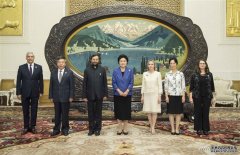Feature: China's Guangxi educational offerings a huge lure f
HANOI, July 22 (Xinhua) -- "I am planning to send my son to study overseas and China is certainly topping the list of choices," Duong Xuan Hang from Vietnam's capital city Hanoi told Xinhua.
After touring the Guangxi-China Education Fair in Vietnam's capital city on Thursday morning, the 40-year-old mother picked up a handful of materials introducing a variety of educational opportunities at universities and colleges in China's Guangxi.
Located close to Vietnam, Guangxi has become a popular destination for Vietnamese students.
According to Lan Tianli, vice chairman of Guangxi Zhuang Autonomous Region, educational cooperation between Guangxi and Vietnam was established in the 1950s when Vietnamese schools were set up in China.
Over the past years, educational cooperation between Guangxi and Vietnam has developed comprehensively, Lan said.
So far, as many as 40 universities and colleges in Guangxi have established ties with some 60 universities and colleges in Vietnam. More than 3,000 Vietnamese students studied in Guangxi in 2015.
In 2015, there were also nearly 1,000 students of Guangxi studying in Vietnam.
Talking about Guangxi, Vietnamese Deputy Minister of Education and Training, Pham Manh Hung, said, "China's Guangxi has beautiful scenery and very friendly people. It also has a high-quality and advanced educational system."
As Vietnam and Guangxi border each other, the convenience in transport has contributed to the development of bilateral cooperation in education, according to the Vietnamese official, adding that these advantages have made Vietnam become a country with the highest number of overseas students in Guangxi.
"China's education, including that of Guangxi, is developing so fast that it stands at the same level with Western countries. So what are the other points that make China a favorable destination for Vietnamese students? It is the two countries' cultural and historical similarity that helps students of the two countries better understand each other," Hoang Anh Tuan, vice rector of the University of Social Sciences and Humanities under Vietnam's National University, told Xinhua.
The geographical proximity and the development of Chinese education are among the reasons inspiring Hang, the 40-year-old Vietnamese mother, to select Guangxi for her son's education.
"China is close to Vietnam and traveling between Guangxi and Hanoi is very convenient. I want to send my son to study abroad so as he can experience a new educational environment."
"My son is going to graduate from high school next year and the information and materials I have collected from this education fair will help him and my family have a better understand about studying in Guangxi," Hang said.
For Phung Minh Toan, a 20-year-old Vietnamese student, becoming a Chinese language teacher in Vietnam is her dream.
"I want to go to China to study as I love Chinese culture and Chinese language. I want to become a Chinese language teacher in Vietnam. I will work as a bridge to connect the people of both countries and help Vietnamese people to understand more about Chinese culture."
"This will be the next step in the ladder of realizing my dream," the young Vietnamese student told Xinhua, while pointing at the booth of China's Guangxi Normal University at the fair.
"I have collected information about Guangxi Normal University and I will go there to study," Toan proclaimed confidently.
Since 2014, the Guangxi-China Education Fair has been held six times across Vietnam. The 2016 fair in Hanoi drew the participation of 24 universities and colleges from Guangxi and the attendance of hundreds of representatives from Vietnamese universities, including students and visitors.
During the fair, eight universities and colleges from Guangxi have signed cooperation agreements with Vietnamese universities and colleges.
"This kind of education fair should be held more regularly to promote the introduction of China's education and bring more educational opportunities to Vietnamese students," Nguyen Van Chinh, Dean of Faculty of Linguistics under the University of Social Sciences and Humanities in Hanoi, told Xinhua.















